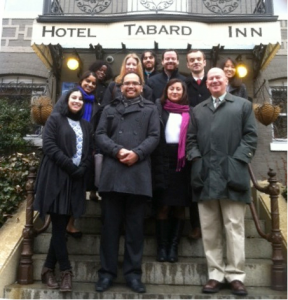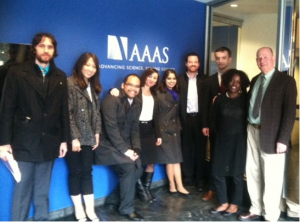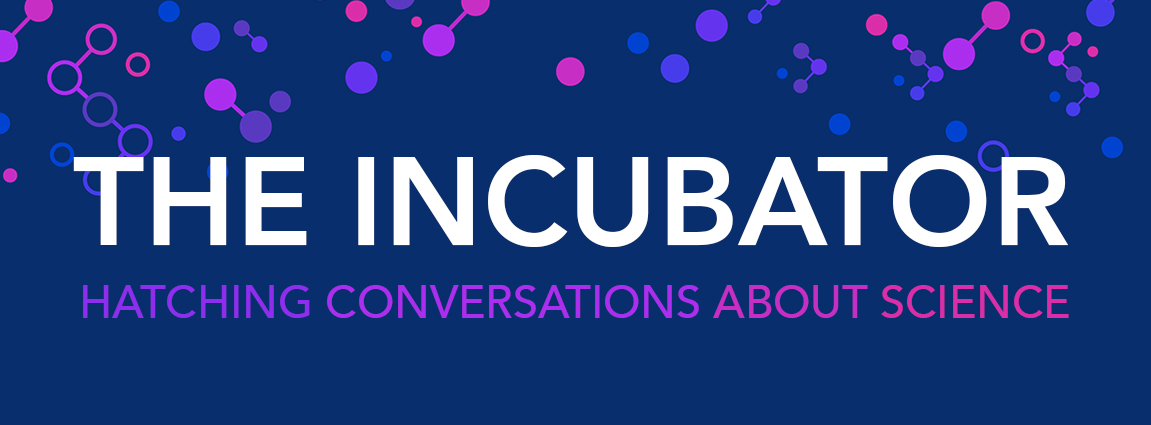Thinking Globally about Science
by Rupa R. Ram and Paul Dominic B. Olinares
There are many global challenges that have a foundation in science and technology including climate change, resource scarcity, infectious diseases, and international instability from nations in conflict. The role of scientists in resolving these challenges is not always clear. Science diplomacy (SD) is the conversation at the intersection of science and policy, where scientists, engineers, and policy makers come together to navigate the sometimes muddy geopolitical waters that hinder finding solutions to the issues at hand.
According to New Frontiers in Science Diplomacy, a report published by the Royal Society in 2010, science diplomacy has three dimensions: 1. “Science in Diplomacy” to form foreign policy objectives, 2. “Diplomacy for Science,” which facilitates international scientific cooperation including between nations in conflict with the hope of improving political relations. These lead to 3. “Science for Diplomacy,” which builds on the generally highly regarded reputation of scientists in society as objective and unbiased to bypass political issues and build consensus towards problem solving.
Despite its trendy name, SD has been practiced for decades. A prominent and ongoing example is the International Pugwash Conferences on Science and World Affairs, which received the Nobel Peace Prize in 1995. Pugwash conferences were founded in the midst of the Cold War in order to bring scholars and public figures together to work towards reducing the danger of armed conflicts and to seek solutions to global security threats. The first conference in Pugwash, Nova Scotia was attended by 22 scientists from all over the world and was based on the manifesto released by Albert Einstein and Bertrand Russell, the Russell-Einstein Manifesto, in 1955 decrying the dangers of nuclear weapons.

Throughout the history of The Rockefeller University there have been many progressive practitioners of SD. Physicist Frederick Seitz, former RU President (1966 to 1978) and former President of the United States National Academy of Sciences (1962 to 1969), participated in Operation Paperclip, in which over 1,500 scientists from Nazi Germany and other foreign countries were brought to the United States for employment after World War II. Microbiologist Alexander Keynan, an adjunct member of the RU faculty, co-chaired the Committee for Scientific Cooperation between Israel and Egypt (1979-1984). More recently, Nobel laureate and former RU President Torsten Wiesel, co-founded the Israeli-Palestinian Science Organization (IPSO). IPSO promotes scientific research and Israeli-Palestinian cooperation in science education in order to build scientific capacities, encourage dialogue, and facilitate better mutual understanding and recognition.
The Rockefeller University is also one of the first universities to offer a course dedicated to science diplomacy. Following their successful pilot SD class in Winter 2013, Mandë Holford, Jesse Ausubel, and Rodney Nichols continue to introduce early career scientists to the diverse landscape of SD. During each week of the six-week course, the instructors introduce a theme and then a distinguished SD practitioner discusses its ethical, political, and economic implications- engaging course participants to think more systematically about the global potential of their research. Themes covered in the 2014 class included global medicine and finance, gender, technology, foreign policy in the Middle East, and SD outside the U.S.
Thanks to RU’s new three-year Hurford Initiative in Science and Diplomacy, the SD course will be offered again in Winter 2015 and 2016. In addition to supporting the course, the Hurford Initiative also allowed for nine RU students and postdocs (including the authors of this article) from eight different nations to visit Washington D.C., to meet with prominent SD experts at various federal agencies earlier this year.
Our first stop was the United States Department of State, where we were hosted by Dr. Kerri-Ann Jones, Assistant Secretary of State, Oceans, and International Environmental and Scientific Affairs and Dr. Jonathan Margolis, Deputy Assistant Secretary of State for Science, Space, and Health. Dr. Jones- who worked as a research technician at RU prior to pursuing her graduate studies in molecular biophysics and biochemistry- discussed how her scientific background is infused in the everyday function of her office. Pertinent to current events, our discussion focused on how bilateral and multilateral engagements involving science and technology affect political agendas, including how the conflict in the Ukraine influences what can be achieved with Russia’s fossil fuel contracts with European countries as well as space shuttle activities with NASA.
The RU delegation was then welcomed at the United States Agency for International Development (USAID) in the Ronald Reagan Building and International Trade Center. RU alumnus Cameron Bess introduced us to USAID members involved in the newly launched Global Development Lab, which applies science, technology, and innovation policies (STIP) to revolutionize the manner in which development funds are used to eradicate extreme poverty, foster sustainable development, and elevate global economic, environmental, and social progress.
That evening, the RU group had dinner at The Cosmos Club, a prestigious private social club incorporated in 1878, whose members include distinguished people in science, literature, and the arts. Among the dinner attendees were eleven scientists and scholars working in various arenas aspects of SD, including Dr. Alex Dehgan, former adviser to the Administrator of USAID, Dr. Thandi Onami from the National Institutes of Health, Vaccine Research Program, Division of AIDS, Ilya Fischoff of the National Climate Assessment, US Global Change Research Program, as well as other members and fellows from USAID, the American Association for the Advancement of Science (AAAS), and the World Association of Young Scientists (WAYS). After an elaborate dinner and a private tour through the historic Cosmos Club building led by Jesse, the evening continued with fervent discussions about science, policies, and research back at the hotel.

The following day, the RU group visited AAAS, home of Science Magazine. Glenn Schweitzer, Director of Office for Central Europe and Eurasia of the National Academies of Science (NAS) and considered a “founding father” of several science diplomacy initiatives, shared his experiences including those involving US-Iran cross-border scientific exchanges. With Schweitzer’s assistance scientists from UC Berkeley and Iran established an exchange program to share research information on earthquakes. Pierce Corden, a visiting Scholar at CSTSP, then discussed his role as a scientist disarming weapons of mass destruction in Iraq and negotiating policies for weapons control and nuclear non-proliferation. Richard Stone, the International News Editor of Science Magazine shared first-hand accounts of his trips to North Korea. Mr. Stone was a part of a rare scientific collaboration between North Korea and researchers from other countries to monitor seismic activity in the Mt. Paektu volcano and the emergence of multi-drug resistant tuberculosis in North Korea. Mr. Stone highlighted that science diplomacy starts with personal scientific connections and what he witnessed with North Korean scientists who rarely have access to Western techniques and equipment was the scientific community there at its best.
For us, this was a very special experience that expanded our thoughts regarding how the research we are pursuing as scientists at RU could have an impact beyond the bench. In addition to enabling our trip to Washington D.C., the Hurford Initiative has also provided funds to launch SD projects initiated by course participants. Projects proposed and funded from the Winter 2014 course cover topics such as sustainable nutrition and agriculture, female hygiene issues in third world countries, and a DNA sequencing incentive to help advance the discovery of emergent pathogens.
Whether science diplomacy aids scientific cooperation involving nations where dialogue may be especially difficult such as currently Israel and Palestine or tackles prevailing global issues in health or environment, it empowers scientists to use their knowledge and expertise to engage in topics that affect many people worldwide and promote well-being and peace. Overall, the trip was a great success and complemented the course perfectly by enabling the course participants to become acquainted with the people, networks, and resources involved in Science Diplomacy. Many thanks go to Mandë and Jesse for planning and leading this very unique field trip and the Science Diplomacy course.

1 thought on “Thinking Globally about Science”